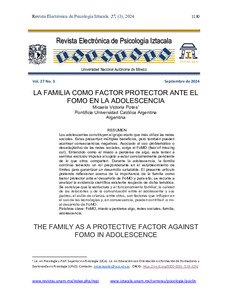Por favor, use este identificador para citar o enlazar este ítem:
https://repositorio.uca.edu.ar/handle/123456789/19017| Campo DC | Valor | Lengua/Idioma |
|---|---|---|
| dc.contributor.author | Potes, Micaela Victoria | es |
| dc.date.accessioned | 2024-11-13T18:25:26Z | - |
| dc.date.available | 2024-11-13T18:25:26Z | - |
| dc.date.issued | 2024 | - |
| dc.identifier.issn | 1870-8420 | - |
| dc.identifier.uri | https://repositorio.uca.edu.ar/handle/123456789/19017 | - |
| dc.description.abstract | Los adolescentes constituyen el grupo etario que más utiliza las redes sociales. Estas presentan múltiples beneficios, pero también pueden acarrear consecuencias negativas. Asociado al uso problemático o desadaptativo de las redes sociales, surge el FoMO (fear of missing out). Entendido como el miedo a perderse de algo, este temor a sentirse excluido impulsa al sujeto a estar constantemente pendiente de lo que otros comparten. Durante la adolescencia, la familia continúa teniendo un rol preponderante en el establecimiento de límites para garantizar un desarrollo saludable. El presente artículo pretende reflexionar acerca de la importancia de la familia como factor protector ante el desarrollo de FoMO y para ello, se recurre a analizar la evidencia científica existente respecto de dicha temática. Se concluye que la estructura y el funcionamiento familiar, la calidad de las relaciones y de la comunicación entre el adolescente y sus padres, el estilo de crianza, entre otros, son factores que influyen en el uso de las tecnologías y, en consecuencia, pueden contribuir -o no al desarrollo de FoMO. | es |
| dc.description.abstract | The group who uses social networks most is adolescents. These have multiple benefits, but they can also have negative consequences. FoMO (fear of missing out) is associated with the problematic or maladaptive use of social networks. This fear of missing out forces people to be constantly aware of what others share. During adolescence, the family continues to play an important role in setting limits to ensure healthy development. This article aims to reflect on the importance of the family as a protective factor against the development of FoMO and to do so, the existing scientific evidence regarding this topic is analyzed.This article aims to analyze the existing scientific evidence regarding the importance of the family as a protective factor against FoMO. It is concluded that the family structure and functioning, the quality of the relationships and communication between the adolescent and their parents, the parenting style, among others, are factors that influence the use of technologies and, consequently, can contribute -or not- to the development of FoMO. | es |
| dc.format | application/pdf | es |
| dc.language.iso | spa | es |
| dc.publisher | Universidad Nacional Autónoma de México | es |
| dc.rights | Atribución-NoComercial-CompartirIgual 4.0 Internacional | * |
| dc.rights.uri | http://creativecommons.org/licenses/by-nc-sa/4.0/ | * |
| dc.source | Revista Electrónica de Psicología Iztacala. 2024, 27(3) | es |
| dc.subject | FOMO | es |
| dc.subject | ADOLESCENCIA | es |
| dc.subject | ADOLESCENTES | es |
| dc.subject | FAMILIA | es |
| dc.subject | REDES SOCIALES | es |
| dc.title | La familia como factor protector ante el FoMO en la adolescensia | es |
| dc.title | The family as a protective factor against FoMO in adolescence | es |
| dc.type | Artículo | es |
| uca.disciplina | PSICOLOGIA | es |
| uca.issnrd | 1 | es |
| uca.affiliation | Fil: Potes, Micaela Victoria. Pontificia Universidad Católica Argentina. Facultad de Psicología y Psicopedagogía; Argentina | es |
| uca.version | publishedVersion | es |
| item.fulltext | With Fulltext | - |
| item.grantfulltext | open | - |
| item.languageiso639-1 | es | - |
| Aparece en las colecciones: | Artículos | |
Ficheros en este ítem:
| Fichero | Descripción | Tamaño | Formato | |
|---|---|---|---|---|
| familia-factor-protector.pdf | 365,6 kB | Adobe PDF |  Visualizar/Abrir |
Este ítem está sujeto a una Licencia Creative Commons

